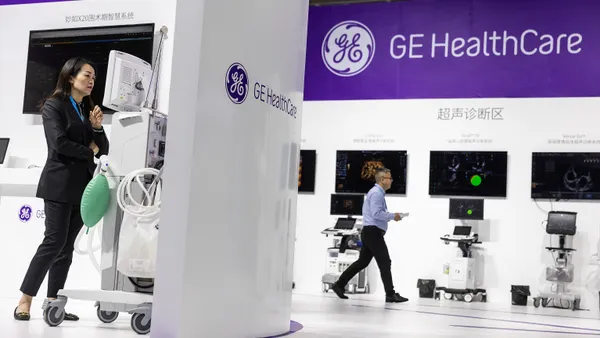Dive Brief:
- A Reaction Data survey of health industry leaders found Amazon far ahead of rivals in perceived "disruption" potential.
- Some 75% of CEOs said the e-commerce giant will cause the most waves. Next was Apple (14%), followed by Google, Microsoft and IBM, according to the report.
- Not only was Amazon seen as the No. 1 disrupter, it got the most mentions when asked about a wide range of topics — from brand loyalty and convenience to predictive analytics and patient engagement. However, attributes associated with Apple, Google, Walmart, Salesforce and other IT companies suggests they are also investing in the healthcare space.
Dive Insight:
To gauge where the future lies in health IT, the researchers surveyed close to 100 healthcare leaders, 80% of whom were in the C-suite. Nearly half of the respondents worked in hospitals.
"(Amazon is) ahead of the game in many ways compared to the other companies," one executive said. Just in the past year, the company has announced a joint venture with J.P. Morgan and Berkshire Hathaway to create a new healthcare company to address employee healthcare issues, forged a partnership with blockchain platform Ethereum and signed a definitive agreement to acquire online pharmacy PillPack. Amazon also has plans to launch a primary care clinic for its employees, according to CNBC.
In the area of emerging technologies, telemedicine is generating the most buzz. Roughly three in 10 healthcare leaders believe virtual care will have the biggest impact on how care is delivered, and nearly three-fourths said they are already using telemedicine. Other technologies execs are watching include artificial intelligence (20%), interoperability (15%), data analytics (13%) and mobile data (11%). Smaller numbers were also excited about advances in data security, the cloud and blockchain.
Yet despite strong interest in telehealth, most providers still see it largely as a source of healthcare for rural areas and follow-up care, managing specific patient populations. And half of respondents said it was financially neutral for their organizations. Just 14% saw a boost in financial performance as a result of telehealth programs.
Adoption of AI, while promising in healthcare, has been slow. More than two-thirds of respondents believe AI is important, but only 15% are within one to two years of adopting it. To sell hospitals on the technology, vendors will need to offer tools that facilitate workflow and integrate well with existing systems, according to the report.
Finally, the report suggests continued consolidation and vertical integration as organizations adjust to the changing healthcare environment and consumer demand. In all, 40% of hospitals and other provider organizations said they are seriously weighing some type of M&A activity in the next few years.
Recent deals include CVS' $69 billion bid for health insurer Aetna, Optum's $2.58 billion purchase of the Advisory Board Company and UPMC's acquisition of Pinnacle Health.












